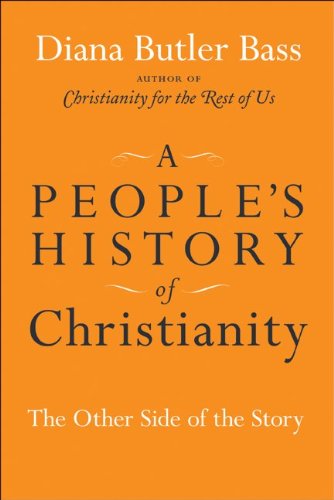 I recently finished Diane Butler Bass’s A People’s History of Christianity. Much like BU Professor Howard Zinn’s A People’s History of the United States, Bass focuses on the undercurrents of tradition alongside the established story that “everyone knows” about Christianity.
I recently finished Diane Butler Bass’s A People’s History of Christianity. Much like BU Professor Howard Zinn’s A People’s History of the United States, Bass focuses on the undercurrents of tradition alongside the established story that “everyone knows” about Christianity.
In doing so, she makes two distinctions from the outset. First, there are at least two different stories of Christianity to be told.
- The first is Big-C Christianity, full of all the triumphilism and conquest and Jesus that we know from history and Sunday School.
- The second is Great-C Christianity, for “Great Commandment”, that traces the stories of people who followed the Greatest Commandment in various ways without subscribing to Christendom.
Bass claims neither is better; she articulates that Triumphilist Christendom understands devotional life better and Great Commandment Christianity understands justice and ethics better. Both are necessary for the Christian life, and thus it is good that both are studied and learned from.
However, Bass is writing a Progressive Christian history, one that understands Tradition not as ways and philosophies that dominate one another, but rather tradition as “making connections though time.” She traces the times and instances, the backstories, the little powerful figures such as Teresa of Avila, the soft side of Augustine, and Abelard’s lover’s tragedy that rarely gets mentioned.
In particular, the latter example of Abelard drew back the curtain a bit more on my favorite Atonement theorist. The extended biography of his secret love, their hidden wedding, and the resulting castration of Abelard by his lover’s family was shocking and Bass’s connection of his experience of ‘rough justice’ and his rejection of violent atonement theories was very interesting. There are many such segments that trace a little-known side of a figure and use it to point towards the subversive history of Great Commandment Christianity.
Here’s a video interview that explains it a bit more: The Ooze TV (or on Youtube)
Personally, while I enjoyed the book, I know why. It seemed more to me like a “Pastor’s History of Christianity” with little nuggets of information that are woven together with lessons…much like a sermon. It’s goal is to persuade that since the beginning there’s been an undercurrent of Progressive Christianity that has only recently begun to rear it head. Since I do identify as Progressive…and I’m a pastor…then obviously it worked for me. But that’s not to say it will be acceptable to everyone.
All in all, I got a lot out of the book, but if you regularly pick apart your pastor’s sermons for factual accuracy and relevant historical lessons…you may want to pass on A People’s History.

I'm just starting to read it; I'll have a review up soon (I hope)!